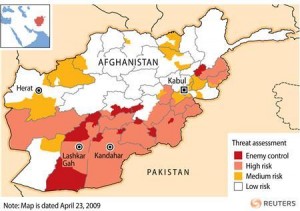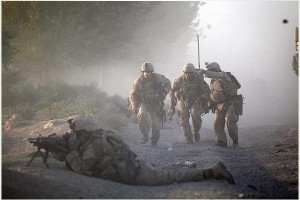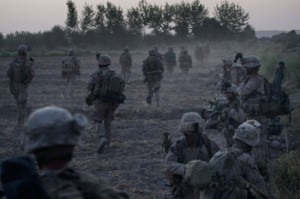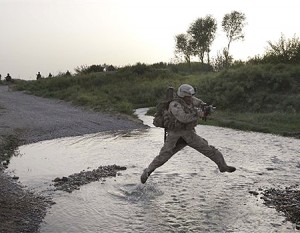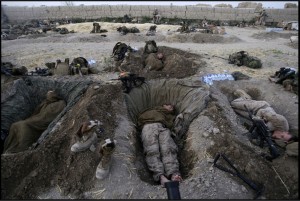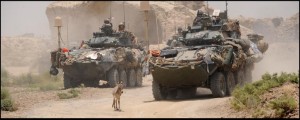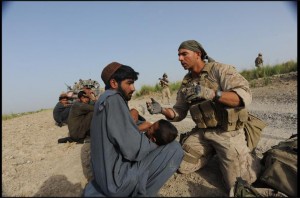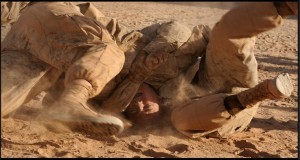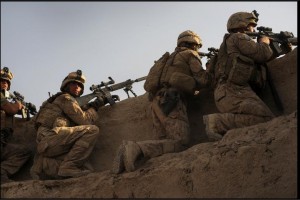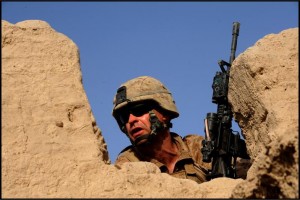Readers know our position regarding the changes to the rules of engagement for Afghanistan. While there is much to be said for the protection of the population in the development and deployment of the new revisions to the ROE, we have observed that there are operations that wouldn’t have been conducted under the recent revisions, including the highly successful operations by the 24th MEU in Helmand in 2008 (and including certain tactics in the Anbar Province of Iraq). Their highly kinetic assault on Garmsir would not have occurred due to the fact that it could not be proven that non-combatants were not still resident in the town.
The Strategy Page gives us their view of the situation in which the Marines are engaged in the Helmand Province.
The U.S. Marine advance into Helmand province is being slowed down by the new Rules Of Engagement (ROE), which forbid the use of bombs or missiles in any situation where there might be civilians. The Taliban will typically spend the night, or longer, in a village or walled compound, and that’s where U.S. troops will typically trap them. But bombs and missiles cannot be used on these places, so U.S. troops have to besiege the place, or just move on, leaving the Taliban alone. Some marines get creative, like having the jet fighters or bombs make a high speed pass over the Taliban held buildings. The fearsome noise will sometimes unnerve the Taliban and cause a surrender, but not as much as it used to. Another favorite tactic is having the fighter (usually an F-16 or F-18) come in low and use its 20mm cannon. But these air craft only carry a few seconds worth of ammunition. Moreover, having these jets fly that low makes them liable to crashing (this has happened, at least once) or being brought down by enemy fire (has not happened yet). But the cannon fire sometimes induces the Taliban to give up, or try to flee.
The other option, when you have the Taliban cornered, and using human shields, is to go in and fight them room-to-room. That gets more Americans killed, as well as putting the Afghan civilians in danger. This room-to-room tactic has not been used much, as commanders don’t want to take the heat for losing troops in that kind of fighting. If there is a lot more of this house to house fighting, and civilians get killed, the ROE may be changed again to forbid any kind of combat if civilians are present. This reduces the anger of locals from civilian deaths involving U.S. forces, but makes it much more difficult to hunt down and destroy the Taliban gunmen. The Taliban are still vulnerable, as they have to move in order to operate, and the Afghan Army or police can often negotiate a surrender, or go in and root them out by force. But the best troops available for chasing down the Taliban gunmen are the U.S. and NATO ones.
Room clearing tactics are costly to the Marines (viz. Fallujah), and aversion to this approach is understandable. But the best troops are of course the U.S. and NATO, since the police are mainly corrupt and the Afghan National Army is mainly drug-addicted and inept. The police and the ANA cannot be relied upon to chase the hard core Taliban. Regarding the Taliban that are allowed to escape because of this change to the ROE, locals have some words to the wise.
“People are withholding judgment,” said the political analyst in Lashkar Gah. “They cannot say whether this operation is good or bad. They are afraid that the (U.S.) forces will stay here for some days and then leave, so we will be alone with the Taliban again.” Many are also waiting to see what the Americans can bring in the way of real development.
“It is still just the beginning,” said Mullah Shin Gul from Nad Ali district. “The Americans need to begin reconstruction, by agreement with the people. They should establish centers here in the districts, and they should follow every single Taliban and kill him. In a short while it will be too late. The people will lose trust.”
The doctrine of population centric counterinsurgency believes, in part, that focus on the population will marginalize the insurgents, causing them to wilt away and eventually rejoin the population and side with the government. True enough for low level insurgents, men who have willingly taken up arms for political and religious motivations don’t usually willingly lay them down.
Because of the new ROE there has been a reluctance to engage locations in which known Taliban are located, allowing them to escape and fight another day. Such tactics may gain the support of the locals for the time being, but they ensure the continuation of the fight. Like the locals said, we must follow and kill every single Taliban. Taking prisoners is not productive.
Prior:
Obama Administration Searching for an Exit Strategy
Marine Take the Fight to the Enemy in Now Zad
Taliban Tactics: Massing of Troops
The Coming War in the Caucasus
Update:
Over at Fabius Maximus, a site I know little if anything about, a commenter and the author presume to know something about the intentions of this article. Let’s listen in for a few minutes.
I totally disagree with this guy’s belief that the US has no choice but to exterminate the Taliban, or even that this is a good goal: “Follow and Kill Every Single Taliban“, Herschel Smith, The Captain’s Journal, 26 July 2009.
At the same time, his analysis of how the Taliban is funded (here) seems probably correct to me …
Fabius Maximus replies: They sound just like governments everywhere. Heroin is the primary product of Helmand Province. Mother Nature made it so, and only vast sums of money wil change that. Recent US history shows that we would rather spend 10x that amount on fighting to control the area rather than a smaller sum to change its economy.
The real question is why folks read trash like “The Captain’s Journal”. There are many real experts writing about the situation in central asia, but America’s bloodlust is stirred by nutjobs yelling “Follow and Kill Every Single Taliban.” It’s a symptom of a nation increasingly ruled by its own paranoia and hubris.
Alas, so much confusion, so little time to work through the problems. The comment was left by someone calling themselves atheist, and Fabius Maximum takes off of the remark to invite himself to criticize someone he doesn’t know and has never read.
This question of globalists and hermeneutics within Islam is a complicated issue, one I have addressed before with Professor Steve Metz of the U.S. Army War College. The set of those who are irreconcilable enemies is certainly a subset of Islam, and even a subset of those currently engaged in fighting U.S. forces in Afghanistan. Recall that The Captain’s Journal strongly supported the notion of concerned citizens in Anbar, later to become Sons of Iraq.
Many of the Sons of Iraq were former insurgents, but fighting for money, boredom, political views or whatever. Certainly a subset of the so-called Taliban fighters are fighting for the same things. The question is not one of killing irreconcilable enemies. War, including counterinsurgency, means doing violence. Irreconcilable enemies must be killed, and in Afghanistan this set of fighters is comprised of globalists and those who would harbor them.
The only real question is how big is this subset of fighters? Joshua Foust and I have politely disagreed before, with me viewing this group as moderately larger than him, and yet in the recent months it would appear that Foust’s view is that the size of this group is edging upwards, while my view is that the size might be edging downwards. Perhaps we will eventually meet in the middle. But all thinking men know that the insurgency is bifurcated.
Now to the specific post and its title. I have found that it’s very hard to keep readers for more than a few minutes. Even when linked at a large venue such as Instapundit, statistics show that most readers want to read an article within less than about three minutes. Many of mine are longer, and the more difficult issue is that my posts comprise a narrative. My readers are usually very sophisticated, and it appears that the readers over at Fabius Maximus haven’t paid attention very well.
Recall the issues surrounding modifications to the ROE for Afghanistan. Without getting into the weeds on this issue again, recall that in subsequent posts I had pointed out that according to objective evidence, the highly successful Marine Corps operations in the Helmand Province (specifically, in Garmsir) in 2008 by the 24th MEU would not have been conducted under the revised ROE. When you can point to successful operations that wouldn’t be conducted under ROE, there is a problem.
This points to unintended consequences. Subsequent to this we pointed out that the revised ROE had allowed Taliban fighters to escape Marine Corps operations with the Marines unable to give chase because of lack of logistics. Finally, in the article above we pointed out that the local residents had stated that the Marines would have to hold the area and chase and kill every last Taliban for the area to be safe. This is the most amusing point of the comments left at Fabius Maximus. They ascribe a comment made by a local in Afghanistan to me since I chose it as the title to an article. Get the picture? They didn’t even read the article. I suppose that the commenter and Mr. Maximus know more about Afghanistan and the Taliban than the locals do.
There is a chain of thoughts necessary to follow my prose, from ROE to giving chase and required logistics and unintended consequences to tactical directives and local views on what it will take to make the area safe. My prose is simply not intended for idiots. Readers .. must .. work .. hard .. and .. try .. to .. stay .. up.
As for Fabius Maximus’ disparaging of The Captain’s Journal, we might remark at what bad form it is and what gross, hillbilly etiquette it takes to trash someone you don’t know, have never communicated with, and whose prose you have never read. It sounds very much like he is the nutjob. His readers can do better.
